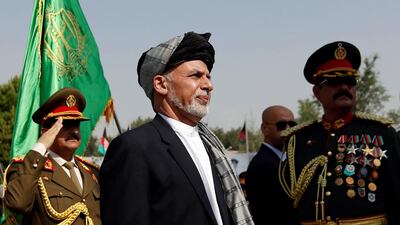It is a single word that outsiders commonly use to refer to nationals of Afghanistan. Its formal placement on the country's long-planned electronic identity card, however, has inspired a hashtag and arguments that reflect a national divide: #IAmNotAfghan.
President Ashraf Ghani and First Lady Rula Ghani became the first citizens to apply for the new card last week. But the proposed use of the word Afghan on its face may scupper the entire multi-million dollar project.
"I am from Afghanistan, but I am not Afghan," Aslam Niazy, a young citizen from Jowzjan province, wrote in a Facebook post, in three different national languages, on Monday. His post ignited a debate about ethnicity and identity among his friends on the social network, which has since spread across the country, reflecting a schism that continues to threaten Afghanistan’s unity.
Despite its initially apparent accuracy, members of minority ethnic groups equate "Afghan" as a synonymous and historic reference of Pashtun ethnicity, a group that makes up more than a third of the population.
"Those who oppose consider that the word Afghan is a reference to one community of Afghanistan and so cannot represent the identity of all citizens," said Ghulam Ali Danishgar, a sociologist in the capital Kabul. "However, geographically we are Afghans."
Across the world, citizens of Afghanistan are also largely and commonly referred to as Afghans. The nation's full name - The Islamic Republic of Afghanistan - also appears along the top of the card.
Although the country is riven by suicide attacks from the Taliban and ISIL insurgents the cards were primarily devised to help provide better access to public services rather than as a means to improve security.
____________________
Second Afghan governor defies President Ghani
Afghanistan suicide attacks killed record numbers in 2017
____________________
Known locally as eTazkira, a reference to the existing paper identity document - needed to get water, electricity, education or housing - the electronic card's introduction has been delayed for years because of ethnic sensitivities.
"It's not just about the word, but about the appeasement of the Pashtun nationalists' groups," says Tahir Qadiry, head of Mitra TV and a senior adviser to Atta Noor, the recently ousted governor of Balkh province, who is an ethnic Tajik and opponent of the identity card scheme.
"Even though Ghani is a Pashtun himself, he has always showed himself to be democratic and not a nationalist. But now when he finds himself losing the Pashtun support, he is using the politics of identity to regain the Pashtun majority," added Mr Qadiry.
Other opponents include the infamous warlord Abdul Rashid Dostum, who despite reputedly being in exile in Turkey retains the title of vice president, and Mohammad Mohaqeq, another anti-Soviet era fighter turned politician. Both them and Noor are planning to boycott the identity card scheme in their constituencies.
And Afghanistan's chief executive Dr Abdullah Abdullah, while not outright critical of the new cards, had called on the government to postpone the launch, pending further consultation.
There is also a broader political interest as the cards should help reduce voter fraud which is rampant in elections. The election commission lacks accurate data and fair voting and ballot counting is a subject of regular dispute, with "ghost votes" a major problem. The electronic cards would also help create a census; the last full one was in 1979 and several attempts since have fallen short.
In an attempt to avoid discord it was proposed near the end of 2017 that the ethnicity of the cardholder would be featured alongside the nationality reference. However, that amendment was also opposed and rejected by several parliamentarians.
"There is no question that we have a crisis of identity and there is no political consensus on matters of ethnic and national identity," Mr Qadiry said, adding that he has often heard comments where ethnic Tajiks have been asked to "go back to Tajikistan". Ethnic Hazaras have also been called Iranians, and Uzbeks referred to as citizens of Uzbekistan.
But not everyone is divided by the ethnicity element of the cards.
Farshid Ghyasi, a Kabul-based businessman, was among the first to sign up on Monday.
"I don’t oppose having the Afghan identity on the ID card, but for practical reasons I don’t believe the nationality, ethnicity and religion should be printed on it," he said, arguing that it could be wrongfully used to discriminate against certain groups. "Our current Tazkira can be easily forged," he added.

